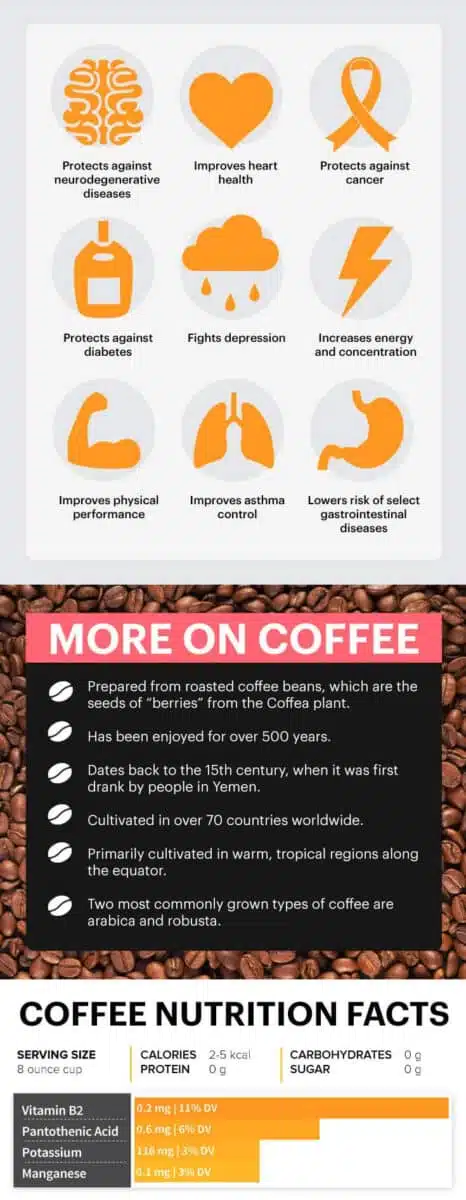Coffee in nutrition plays a pivotal role in modern diets, offering numerous benefits backed by research. This beloved beverage isn’t just a morning ritual; it contributes essential nutrients and antioxidants that support overall health. As consumers increasingly seek clarity on the health impacts of their choices, understanding coffee’s complex relationship with nutrition becomes crucial. Notably, its effects extend beyond mere caffeine stimulation, influencing metabolism, mental health, and even weight management. So, let’s explore why coffee deserves a standout position in discussions about nutrition.
Introduction to Coffee and Nutrition
Coffee plays a significant role in our daily lives, yet many overlook its contributions to nutrition. From its energizing effects to its complex flavor profile, coffee in nutrition extends far beyond a mere morning routine. This beloved beverage is packed with essential nutrients and bioactive compounds that can influence our health in various ways.
Consider the following aspects of coffee in nutrition:
- Energy Boost: The caffeine in coffee stimulates the central nervous system, enhancing alertness and reducing fatigue.
- Nutritional Components: Coffee contains vitamins and minerals, such as B vitamins, potassium, and magnesium, which contribute to overall health.
- Antioxidant Properties: Coffee ranks as one of the highest sources of antioxidants in the diet, helping fight inflammation and oxidative stress.
Additionally, various scientific studies have explored the relationship between coffee and numerous health benefits. For instance, moderate coffee consumption may lower the risk of certain diseases, enhance cognitive function, and improve physical performance.
However, understanding coffee’s role in nutrition entails balanced consumption. While many enjoy their daily cups, it’s crucial to consider both benefits and potential risks associated with excessive intake. Thus, delving deeper into the specific components and effects will provide a clearer picture of coffee in nutrition and its impact on overall health.
The Nutritional Components of Coffee
When we discuss coffee in nutrition, it’s essential to highlight its significant nutritional components that contribute to its health benefits. Despite being primarily a beverage, coffee packs a punch with various bioactive compounds:
- Caffeine: The most renowned component, caffeine enhances alertness and cognitive function.
- Antioxidants: Coffee is rich in antioxidants, such as chlorogenic acid, which help reduce oxidative stress in the body.
- Vitamins and Minerals:
- Vitamin B2 (Riboflavin): Important for energy production.
- Vitamin B3 (Niacin): Aids in metabolism and skin health.
- Magnesium: Plays a critical role in muscle and nerve function.
- Potassium: Helps in maintaining fluid balance and blood pressure.
Here’s a simplified comparison of the nutritional components found in an 8-ounce cup of brewed coffee:
| Component | Amount (approx.) |
|---|---|
| Caffeine | 95 mg |
| Antioxidants | 400 mg |
| Vitamin B2 | 0.2 mg |
| Vitamin B3 | 0.9 mg |
| Magnesium | 7 mg |
| Potassium | 116 mg |
In summary, the coffee in nutrition provides an array of essential nutrients that not only invigorate but also support overall well-being. Consuming coffee in moderation enables individuals to enjoy these benefits while maximizing its positive effects on health.
Health Benefits of Coffee Consumption
Coffee in nutrition offers an array of health benefits that contribute significantly to overall well-being. Regular consumption of coffee can lead to a variety of positive effects, which include:
- Enhanced Energy Levels: Coffee effectively boosts energy due to its caffeine content, helping improve physical performance and alertness.
- Improved Cognitive Function: Studies show that caffeine enhances brain function, improving attention, reaction times, and even focus.
- Reduced Risk of Certain Diseases:
- Type 2 Diabetes: Research indicates that moderate coffee drinkers have a lower risk of developing type 2 diabetes.
- Parkinson’s Disease: Coffee consumption may lower the risk of Parkinson’s due to its neuroprotective effects.
- Liver Diseases: Drinking coffee has been linked to a decreased risk of liver cirrhosis and liver cancer.
| Health Benefit | Impact |
|---|---|
| Enhanced Energy | Increased alertness and performance |
| Cognitive Function | Improved memory and concentration |
| Type 2 Diabetes Risk | 25-30% lower risk for regular drinkers |
| Parkinson’s Disease | Neuroprotective properties |
| Liver Protection | Reduced risk of cirrhosis and cancer |
Incorporating coffee into your daily routine can maximize these health benefits. However, balance is key to enjoy the benefits of coffee in nutrition without experiencing negative side effects.

Coffee as an Antioxidant Source
Coffee is more than just an energizing beverage; it serves as a significant source of antioxidants, which play a crucial role in overall health. These compounds combat oxidative stress, reducing the risk of various chronic diseases. Interestingly, coffee in nutrition offers a higher antioxidant capacity compared to certain fruits and vegetables.
Key Antioxidants in Coffee:
- Chlorogenic Acid: This is the primary antioxidant in coffee, known for its anti-inflammatory properties.
- Melanoidins: Formed during the roasting process, these complex compounds also contribute to coffee’s antioxidant activity.
- Quinines: Present in brewed coffee, these antioxidants further enhance coffee’s protective benefits.
Comparison of Antioxidant Content:
Here’s a comparison table highlighting the antioxidant content of coffee versus other common sources:
| Source | Antioxidants (mg per 100g) |
|---|---|
| Coffee | 1,200 – 2,500 |
| Blueberries | 4,000 – 5,000 |
| Green Tea | 1,000 – 1,500 |
| Dark Chocolate | 1,600 – 2,200 |
As the table illustrates, coffee stands out with a remarkable amount of antioxidants, making it a vital component of coffee in nutrition. Regular consumption may contribute to improved health outcomes, including reducing inflammation and potentially lowering the risk of cancers.
In summary, coffee serves as a powerhouse of antioxidants, making it an invaluable addition to a balanced diet. Moreover, understanding the role of coffee in nutrition emphasizes its potential health benefits while encouraging thoughtful consumption.
Impact of Caffeine on Metabolism
Caffeine, a natural stimulant found in coffee, plays a significant role in enhancing metabolism. When we consume coffee, the caffeine content stimulates the central nervous system, leading to increased energy expenditure. Here’s how caffeine influences metabolic processes:
- Increased Basal Metabolic Rate (BMR): Caffeine has been shown to raise BMR, enabling the body to burn more calories at rest.
- Enhanced Fat Oxidation: By promoting the breakdown of fat stores, caffeine can improve fat oxidation, particularly during exercise.
- Improved Exercise Performance: Caffeine enhances endurance and strength, allowing for more intense workouts, which further boosts calorie burning.
Comparison of Caffeine Sources and Their Metabolic Effects
| Source | Caffeine Content (mg per 8 oz) | Metabolic Impact |
|---|---|---|
| Brewed Coffee | 95 | High energy expenditure |
| Espresso | 63 | Quick energy boost |
| Green Tea | 30-50 | Moderate metabolism boost |
| Energy Drinks | 80-200 | Variable (often high sugar) |
While coffee in nutrition offers a beneficial boost to metabolism, moderation is key. Excessive caffeine can lead to side effects such as jitters, insomnia, and increased heart rate. Therefore, incorporating coffee into a balanced diet can optimize its metabolic benefits without risking adverse effects. By understanding the impact of caffeine on metabolism, individuals can make informed choices related to their coffee consumption.
Coffee and Mental Health
Coffee in nutrition extends beyond its physical benefits, impacting mental health significantly. Studies suggest that moderate coffee consumption can enhance mood and cognitive function. Here are the key aspects to consider:
- Mood Enhancement: Caffeine, the primary psychoactive component in coffee, can boost dopamine levels, which may elevate mood and reduce feelings of depression.
- Cognitive Function: Regular consumption of coffee may sharpen memory, enhance focus, and improve overall mental clarity. Some research even indicates that it could lower the risk of neurodegenerative diseases such as Alzheimer’s and Parkinson’s.
- Stress Reduction: Interestingly, coffee may also help alleviate stress. The ritual of enjoying a cup can serve as a calming routine, providing a sense of comfort amid daily chaos.
Comparison of Mental Health Effects
| Coffee Intake | Effect on Mental Health | Caution |
|---|---|---|
| Moderate (3-4 cups) | Positive mood enhancement | Excessive consumption may cause anxiety |
| High (>4 cups) | Potential increase in anxiety | Can disrupt sleep patterns |
| Low (<2 cups) | Limited effect | May not provide cognitive benefits |
Ultimately, integrating coffee in nutrition can yield positive mental health effects as long as individuals maintain moderation. Understanding your personal tolerance is crucial to enjoying its benefits while avoiding potential pitfalls. Remember, balance is key!
Coffee’s Role in Weight Management
When it comes to coffee in nutrition, its role in weight management deserves special attention. Numerous studies highlight how coffee can assist with weight loss, primarily due to its unique properties.
Key Points on Coffee and Weight Management:
- Caffeine Boosts Metabolism: Caffeine, a primary component of coffee, can increase your metabolic rate by 3-11%. This effect helps your body burn more calories even when at rest.
- Fat Oxidation: Research indicates that caffeine enhances fat oxidation, aiding the body in utilizing fat as a fuel source. This vital mechanism can be especially beneficial for those looking to shed pounds.
- Appetite Suppression: Some studies suggest that coffee may help suppress appetite for a short period. Consequently, this can lead to reduced calorie intake overall.
Comparison of Different Coffee Types:
| Type of Coffee | Calories (per 8 oz) | Metabolism Boost (%) | Fat Oxidation |
|---|---|---|---|
| Black Coffee | 2 | Up to 11% | Moderate |
| Espresso | 1 | Up to 7% | Moderate |
| Coffee with Cream/Sugar | 50-70 | Minimal | Low |
In conclusion, coffee in nutrition showcases its multiple benefits for weight management. However, integrating it into a balanced diet is vital for optimal results. Enjoying your daily cup with a mind towards moderation can enhance your weight loss journey and maintain overall health.

Potential Risks of Excessive Coffee Intake
While coffee in nutrition offers an array of benefits, moderation is crucial to avoid potential risks associated with excessive consumption. Here are the key concerns:
- Caffeine Overload: High caffeine intake can lead to anxiety, restlessness, and insomnia.
- Digestive Issues: Coffee stimulates gastric acid production, potentially causing heartburn or indigestion if consumed in excess.
- Dependency: Regular high consumption may lead to caffeine dependency, resulting in withdrawal symptoms such as headaches and fatigue when intake decreases.
- Heart Health: Some studies suggest that too much caffeine can elevate blood pressure, increasing the risk of heart problems for susceptible individuals.
- Pregnancy Concerns: High coffee consumption during pregnancy may be linked to low birth weight and miscarriages.
| Risk Factor | Description |
|---|---|
| Caffeine Overload | Can cause anxiety, restlessness, and insomnia. |
| Digestive Issues | May lead to heartburn or digestive discomfort. |
| Dependency | Can result in withdrawal symptoms like headaches. |
| Heart Health | Possible elevation in blood pressure. |
| Pregnancy Concerns | Linked to low birth weight or possible miscarriages. |
To ensure a balanced approach, limit coffee consumption to 3-4 cups per day. Acknowledging the potential risks of excessive coffee intake allows you to enjoy the positive aspects of coffee in nutrition while minimizing any adverse effects.
Coffee and Cardiovascular Health
Coffee in nutrition has garnered attention for its potential effects on cardiovascular health. Numerous studies suggest that moderate coffee consumption may contribute positively to heart health. Here are some key points to consider:
- Positive Associations: Research indicates that moderate coffee drinkers (3-5 cups per day) often experience lower risks of heart disease compared to non-drinkers. This correlation could stem from coffee’s beneficial properties.
- Polyphenols: Coffee is rich in polyphenols, which are powerful antioxidants. These compounds help reduce inflammation and improve blood vessel function, ultimately supporting heart health.
- Blood Pressure Impact: While caffeine can cause a temporary increase in blood pressure, studies show that regular coffee consumers may adapt over time, leading to no significant changes in their overall blood pressure levels.
- Cholesterol Levels: Certain studies suggest that unfiltered coffee may raise LDL cholesterol levels. However, filtered coffee seems to mitigate this risk, indicating the importance of brewing methods.
| Coffee Type | Effect on Cholesterol | Polyphenol Content | Recommended Cups |
|---|---|---|---|
| Filtered Coffee | Neutral | High | 3-5 |
| Unfiltered Coffee | Increased | Moderate | 1-2 |
In summary, coffee in nutrition can play a positive role in cardiovascular health when consumed in moderation. Always consider individual health conditions and consult health professionals when incorporating coffee into your diet.
Cultural Perspectives on Coffee Consumption
Coffee in nutrition transcends mere consumption; it embodies cultural significance across various societies. From the bustling cafes of Italy to the traditional coffee ceremonies in Ethiopia, coffee plays a central role in social interactions and rituals. Here’s how different cultures embrace coffee:
- Italy: In Italy, coffee is synonymous with socializing. The espresso culture emphasizes quick consumption, often enjoyed standing at the bar.
- Ethiopia: The birthplace of coffee, Ethiopia, celebrates it through an elaborate coffee ceremony, symbolizing hospitality and community.
- Turkey: Turkish coffee is world-renowned, served unfiltered and rich. It often comes with a side of sweets, showcasing the importance of coffee in familial and social gatherings.
Contrastingly, in Scandinavian countries, coffee breaks or “fika” signify a pause in the busy day, encouraging connection among colleagues and friends.
Comparison of Coffee Cultural Practices:
| Culture | Preparation Method | Social Role |
|---|---|---|
| Italy | Espresso | Quick social gatherings |
| Ethiopia | Coffee Ceremony | Ritualistic and communal |
| Turkey | Unfiltered | Accompanied by sweets; festive |
| Scandinavia | Brewed | Work breaks promoting socializing |
Overall, coffee in nutrition goes beyond its health benefits; it unifies cultures, making every cup a story worth sharing. With each sip, we partake in a rich tapestry of traditions and community bonds shaped by this beloved beverage.

Conclusion: Balancing Coffee in Nutrition
In summary, coffee in nutrition serves as both a beloved beverage and a source of essential nutrients. To maximize its benefits, it’s vital to strike a balance in consumption. Here are key points to consider for integrating coffee into a healthy diet:
- Moderation is Key: Aim for 2-4 cups of coffee per day. This offers a good balance of health benefits without overwhelming your system with caffeine.
- Be Mindful of Additives: Sugar, cream, and flavored syrups can quickly turn a healthy cup of coffee into a calorie-dense treat. Opt for healthier additions, such as milk alternatives or natural sweeteners.
- Stay Hydrated: Coffee can act as a mild diuretic. Pair your daily coffee intake with adequate water consumption to stay hydrated.
- Monitor Your Body’s Response: Everyone’s tolerance to caffeine varies. Pay attention to how coffee affects your energy levels and overall health.
- Choose Quality Beans: Research shows that different coffee varieties can vary in antioxidant levels. Selecting high-quality, organic coffee can enhance the health benefits of coffee in nutrition.
Ultimately, coffee can be a valuable component of a nutritious diet when enjoyed mindfully. By understanding both its benefits and potential drawbacks, you can effectively incorporate coffee into a balanced lifestyle.
Frequently Asked Questions
What are the nutritional benefits of coffee?
Coffee is not just a popular beverage; it also offers various nutritional benefits. It is rich in antioxidants, such as chlorogenic acid and polyphenols, which help combat oxidative stress in the body. These antioxidants support heart health by improving blood circulation and may even lower the risk of certain chronic diseases, including Type 2 diabetes and certain types of cancer. Furthermore, coffee comes with essential nutrients like B vitamins, potassium, and riboflavin, all of which contribute positively to overall health.
How does coffee consumption affect metabolism?
Drinking coffee can have a significant effect on metabolism, primarily due to its caffeine content. Caffeine is a well-known stimulant that can temporarily increase metabolic rate by stimulating thermogenesis, the process through which the body generates heat and energy. Regular coffee drinkers may notice improved fat oxidation as caffeine encourages the body to burn fat for energy more efficiently. However, the effects can vary depending on individual tolerance to caffeine and overall lifestyle.
Can coffee help with weight management?
Coffee may aid in weight management for several reasons. Caffeine acts as an appetite suppressant, which can reduce hunger and help individuals maintain a lower-calorie intake. Additionally, coffee’s metabolism-boosting effects can enhance calorie burning during exercise. When coupled with a balanced diet and active lifestyle, regular coffee consumption may assist in achieving and maintaining a healthy weight. However, it is essential not to rely solely on coffee as a weight loss strategy, as nutritional balance is crucial.
Is there a risk of dependency on coffee?
Yes, there is a potential for dependency on coffee, primarily due to its caffeine content. Regular consumption can lead to the body developing a tolerance, meaning that greater amounts may be needed to achieve the same stimulating effects. Moreover, abrupt cessation can result in withdrawal symptoms, including headaches, fatigue, and irritability. It is vital to consume coffee in moderation to mitigate the risk of dependency and to be mindful of individual caffeine sensitivity.
What is the recommended daily intake of coffee?
The recommended daily intake of coffee can vary based on individual health conditions and sensitivity to caffeine. Generally, most health experts suggest that moderate coffee consumption of about 3 to 4 cups per day, which translates to roughly 300 to 400 mg of caffeine, is safe for most adults. However, individuals with certain health issues, such as anxiety disorders or heart conditions, may need to limit their intake further. Always consult a healthcare professional for personalized recommendations.

